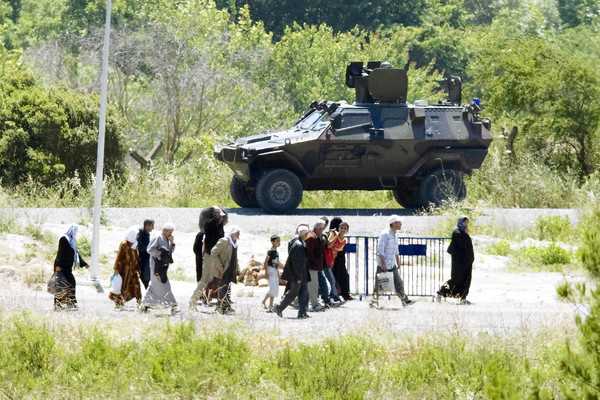Pro-democracy activists say Syrian troops and tanks have rolled into areas near the border, across which refugees have fled to makeshift camps. The move could further strain ties with longtime ally Turkey, which has been critical of the crackdown.
By Alexandra Sandels, Los Angeles Times
June 24, 2011
Reporting from Beirut—

Syrian refugees pass a Turkish military vehicle as they cross the border near the Turkish village of Guvecci in Hatay province. Syrian activists say Syrian troops backed by tanks and snipers have entered a village along the border. (Burhan Ozbilici, Associated Press / June 24, 2011)
Syrian army units massed near the border with Turkey on Thursday, according to Syrian pro-democracy activists and media accounts, with some troops, backed by tanks, rolling into a village close to makeshift refugee camps housing civilians who fled villages in northwest Syria.
The expanded troop presence in the border zone could further aggravate already strained relations with Turkey, which has been critical of the ongoing Syrian crackdown on antigovernment protests.
An activist group, the Local Coordination Committees in Syria, said 40 tanks had been deployed in the border village of Khirbet Jouz and that snipers had taken positions on rooftops.
Syria has imposed severe restrictions on news coverage, making it difficult to independently verify activists’ accounts of the ongoing uprising against President Bashar Assad and his family’s decades-long regime.
Video aired by the Al Jazeera news channel showed Syrian military activity in full view of the Turkish border, including tanks with Syrian flags on a nearby hill and troops atop a tall building.
The Turkish Red Crescent said another 600 refugees had arrived in Turkey in response to the latest Syrian military move, joining the more than 10,000 who have fled in recent weeks.
The Associated Press reported that Turkish troops in the border area moved their positions back several hundred feet in an apparent bid to avoid a confrontation with the Syrian forces.
One analyst said the Syrian advance probably was more a case of asserting control of its territory than a deliberate provocation of its increasingly critical neighbor. The Syrian and Turkish foreign ministers discussed the border situation in a telephone conversation, Turkey’s semi-official Anatolian news agency reported.
For weeks, the Syrian army has attempted to root out opposition to Assad in northwestern cities and villages. Syrian state media has said that the army and security forces are hunting “armed terrorists” in the rugged mountainous areas near Turkey, an allegation that human rights activists deny.
In Brussels, the European Union said it had expanded its sanctions list against the Syrian regime, targeting seven more individuals and four companies, AP reported. That brings to 34 the number of people and entities, including Assad, faced with an asset freeze and travel ban. The EU also has an embargo on sales of arms and equipment that can be used to suppress demonstrations.
On Wednesday, Syria’s foreign minister, Walid Moallem, assailed European governments for the sanctions and said the West was fomenting unrest and instability in the Arab nation.
Despite the government crackdown, Syrian protesters called for new demonstrations.
Activists on the Syrian Revolution 2011 Facebook page — which has become an important force behind the protest movement — called Thursday for a nationwide general strike and urged fresh protests Friday.
The Syrian opposition estimates that 1,400 people have been killed since the protests began three months ago and that about 10,000 have been detained.
Sandels is a special correspondent. Times staff writer Patrick J. McDonnell in Tunis, Tunisia, contributed to this report.
via Syria conflict Turkey: Syrian troops said to mass on northwest border with Turkey – latimes.com.



